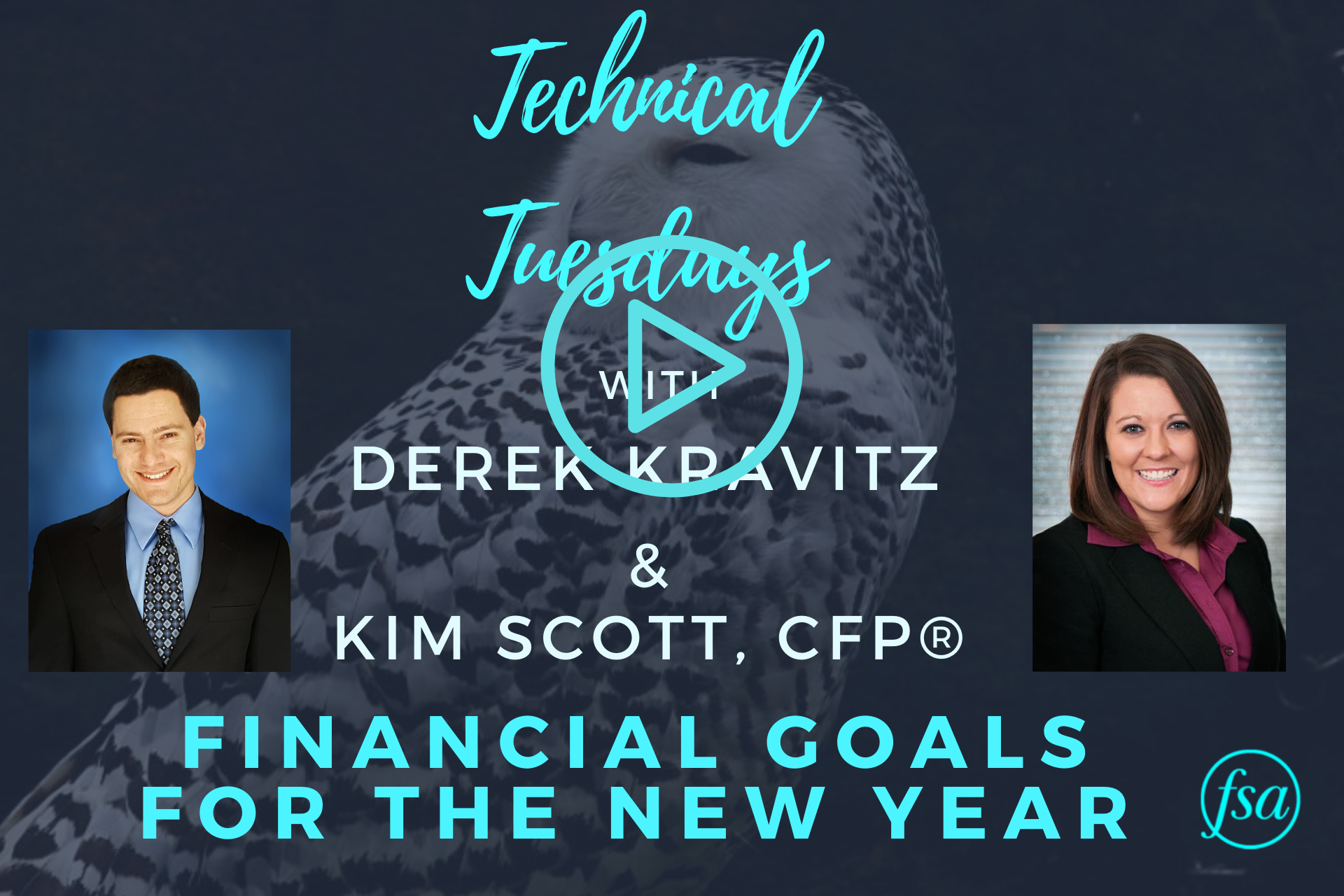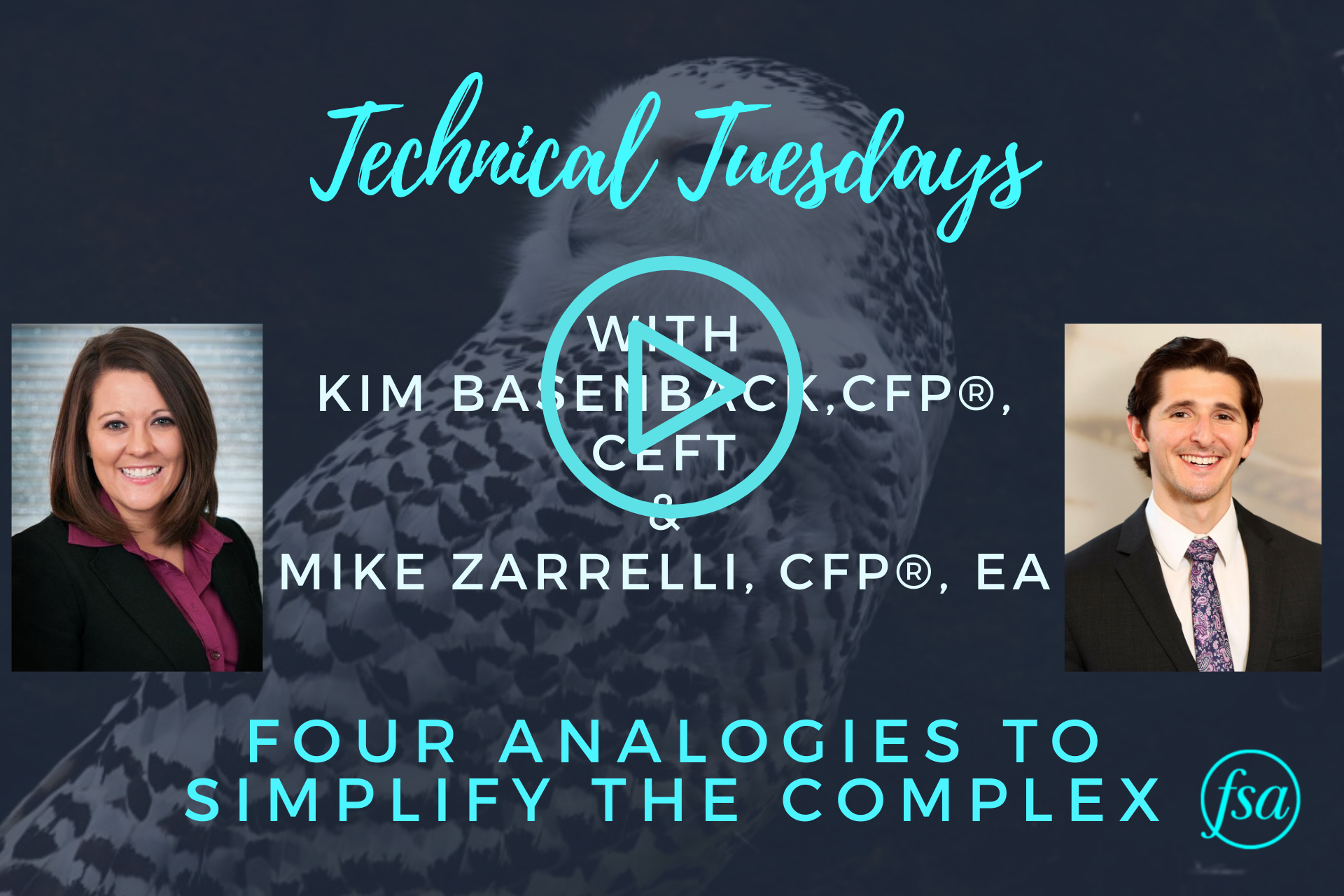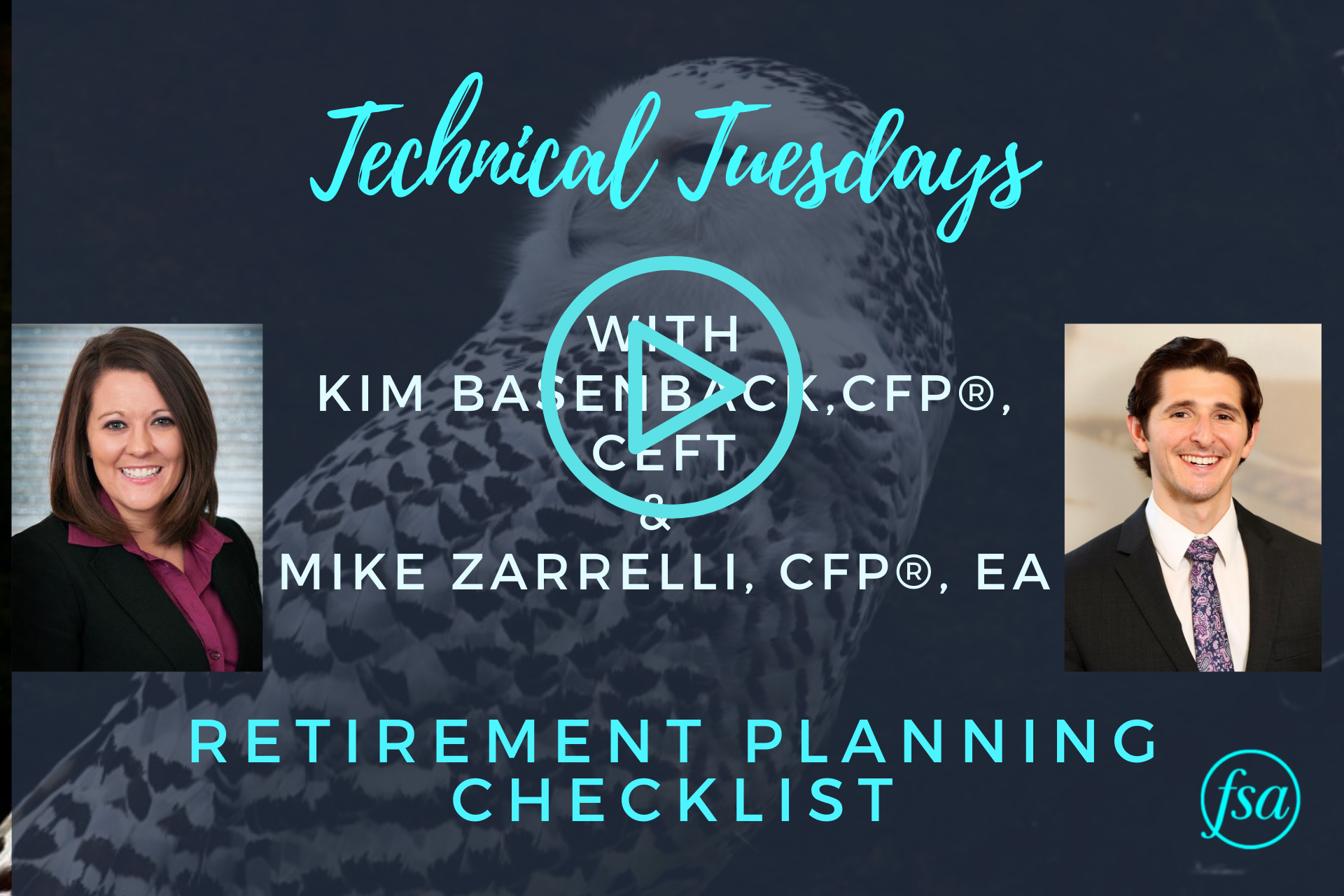Kim Scott and Derek Kravitz discuss smart goal setting in our first 2021 edition of Technical Tuesdays.
SMART Goals Transcript
Derek Kravitz:
Hi everybody. Welcome to another Technical Tuesdays with Kim and Derek. Kim, how are you doing today?
Kim Scott:
I’m great Derek. How are you doing?
Derek Kravitz:
I’m doing well. Happy new year. And now that the new year is upon us, Kim and I thought that this episode of Technical Tuesdays might provide a good opportunity for us to sort of discuss those personal finance goals and resolutions that you may have, that we have. We’re going to dive into our own personal ones today and just flush out a few of those based on a framework that Kim has brought to us today, and we’re going to just kind of walk through some of those goals and see how they fit within that framework. So, Kim, why don’t you explain to us what that looks like?
Kim Scott:
Awesome. Thanks Derek. Yeah. So sometimes when you’re setting goals, it’s hard to know where to start. So one framework that we like to use is asking the question of if it’s a smart goal. So each goal should have each of these qualities, S-M-A-R-T. So S being is it specific? So making sure that your goal isn’t too broad. It’s more narrow, more specific. The M being is it measurable? Is it something that when you get to the end of the timeframe – generally since it’s a new year, it’s the calendar year – is it something that you can measure the results and that you can measure you achieving it? That leads into the A, is it achievable? You want to be realistic. You don’t want to set a goal that you can’t realistically achieve in that timeframe because that would just cause you to be discouraged, then not able to achieve that.
And then R is relevant. You want to make sure that that goal is relevant to your longer term goals. And then the T is time-based. So again, this kind of naturally happens when you base it on the calendar year. So that’s the time-base. You want to have a specific amount of time that you’re setting this goal for. So now that we’ve kind of set the framework, it’s a little bit easier if we kind of walk through some examples. So Derek, if you’ll be our guinea pig, can you tell us maybe a goal that you have for 2021?
Derek Kravitz:
Yeah, definitely. I would love to. So a goal for me would be to pay off the remaining credit card balance that I carry on currently a zero interest credit card that eventually, those promos run out, and I’m sure in another video we’ll get into taking advantage of credit card offers and where to steer clear of certain pitfalls that those generous offers. But I have a 0% credit card balance currently and aiming to get that all paid off before it obviously flips over to a much higher interest rate. So that’s kind of goal number one for me on the personal finance front for 2021.
Kim Scott:
Perfect. So why don’t we walk through some of that framework to make sure it fits into that smart goal? So the first being specific. Would you say that’s a specific goal?
Derek Kravitz:
Yeah, I think so.
Kim Scott:
I would agree. It’s very finite. You have a specific amount of the credit card debt that you want to make sure that you pay off in that specific timeframe. Is it measurable?
Derek Kravitz:
Yes, it is because there’s a set dollar amount, and I’ll lay it out there. It’s $2,000. And so I basically figured out how much I need to pay per month to get it all paid off before the zero interest offer expires.
Kim Scott:
Perfect. And do you feel like that’s achievable in that timeframe?
Derek Kravitz:
Yes, I do. I do. I think especially just budgeting wise, laying out a budget, just slotting it into that budget and having the 12 months of the year to pay it off. I think it is very much achievable.
Kim Scott:
Love it. I agree. And then relevant, relevant to your kind of longer-term goals.
Derek Kravitz:
Yeah. I think the long-term goal that every young person should strive for on the personal finance front is to eventually have all their debts paid off, whether it be student loans or credit cards or mortgages, whatever, over the long-term you want to have your debts paid off, and I think that’s relevant because in order to establish kind of a good foundation for the rest of your life in terms of your personal finances is getting that credit card debt squared away and paid off so that your credit score increases and obviously you’re not paying interest and all that other stuff. So I think it is very much relevant.
Kim Scott:
I totally agree. And I think the last one is obviously a given time base, and it is because you have that set finite time before that interest rate kicks in that you want to make sure it’s paid off in. So perfect. I think that’s a great example of a smart goal, and I think it would also be helpful for the viewers to hear kind of what works well for you and how you kind of track your goal. So before we go there, any other goals you have for 2021 that you want to share? And then we can walk through what you’re doing to track them.
Derek Kravitz:
Yeah. So I’ve got two other big goals this year. The first would be that I want to have enough in savings to at least be able to put a down payment on a house with FHA, which they only require 3.5% or so for a down payment. Not that I’m absolutely with certainty going to be purchasing a house this year, but I would at least want to be by the end of the year in a position that if I did find a place that I really loved, I could at least start the process of being able to purchase a home. And this is something that I think it’s relevant, there’s that R, to carry on into 2021. It doesn’t have to be confined to this year, but at least that’s the goal for this year, to be able to end 2021 in a position, if I so chose, to be able to put a down payment as a first-time home buyer on the first home.
So that’s big goal number one. The second goal would be to max out the Roth IRA contribution again, and this would be the third year that I’ve done that. So I know it’s A, achievable, and just because we’ve done it once or twice already doesn’t mean that it shouldn’t not be a goal again. I think it’s a very good goal, especially for those of us like you and me who are kind of on the younger end, we’re in the accumulation phase of wealth building. I don’t want that to ever not be a goal because I think it’s incredibly relevant.
Kim Scott:
Awesome. So then what would you say for each of those goals, or in general, what do you do to make sure that you achieve them? What works for you?
Derek Kravitz:
Yeah, absolutely. And this is, actually, I think, going to be a really interesting thing to discuss because I know that you and I have a couple of differences here. Both are totally acceptable but kind of different ways of getting to the same goal line. And for me, I know that setting Google reminders on payday to log into my bank account, or my brokerage account if we’re talking about the Roth, to transfer money over from the paycheck, and I know some people like to automate this. Personally, I find that there is a deep sense of satisfaction of seeing, okay, here’s the product of my labor for the last couple of weeks, and I’m choosing very actively to put this into a savings of some sort or paying down the credit card, and it’s just something that works for me. Some people don’t want to have to do that. They automate, but I really like being able to log in, click, and see the money go to these places because then I know it’s happening, and it’s just kind of a fulfilling feeling to know that I’m doing this, I’m achieving these goals slowly but surely.
Kim Scott:
Yeah. I could absolutely see that. So you said kind of how you do it, which is you go in every payday and kind of transfer and you have those Google reminders. What else works for you as far as making sure that, whether it’s something that you do for yourself, if you do achieve the goal, is it some sort of incentive or how do you track? Anything else you want to share as far as your goals and what works well for you?
Derek Kravitz:
Yeah. So that’s a great question, and this is actually the really fun part that we can talk about because here at FSA, and I think if you spoke to most financial planners, a lot of the discussion is about, of course, setting those big goals, making sure you’re on track for retirement and all that. But for me personally, I know what I have found that works is that I want to kind of be looking at these goals and looking also to if you consider these longer-term things to be dinner, let’s have some dessert too. So I want to have a reward kind of in the near term for being such a good saver and planning financially in a very diligent way.
So for me, for example, something that I’m looking at doing this year is buying a new motorcycle, but in order to do that, I need to have certain other goals met. So if I max out the Roth contribution by the summer, then the agreement that I’ve had with myself is, okay. I can go ahead and purchase the motorcycle. And that’s kind of like a nice little way to say, “All right. Well, you’ve done the hard work and now you can have a little fun in the near term,” because we obviously work every week and we want to be able to enjoy the fruits of our labor now too instead of having to wait all the way until retirement for that. So that’s kind of how I look at it is that kind of like a carrot approach for myself is here’s the incentive to be able to do this as well. That’s a big thing that works for me.
Kim Scott:
That’s great. Yeah. I love that. Seeing that you can reward yourself when you do achieve those goals. That’s great.
Derek Kravitz:
Yeah. So I guess at this point, let’s turn it around and hear from you. Can you tell us about your goals for 2021 and walk us through how they fit into this smart framework?
Kim Scott:
Sure. Yeah. So I would say I have two big goals for 2021. I would like to buy a house. So that means making sure that, to your point, I have enough for a down payment. And the second goal is I’d like to contribute at least 10% to my 401k. So those are my two kind of big goals for the year.
Derek Kravitz:
That’s great. Okay. So we’ve got specific, right? You’ve got the goal for a down payment and 10% on the 401k. Achievable, A achievable. You believe that they’re achievable, right?
Kim Scott:
Yes. Yeah, yeah. So similar to you, I kind of, in both situations, figured out how much I need by the end of the year. Well, the 10% is kind of just 10% every paycheck I make sure goes into my 401k. And then on the down payment side, looking at the total amount that I need, how much I already have saved, and then kind of divide that out into monthly chunks that I’ll need to save. So it does feel achievable to me.
Derek Kravitz:
And I was just going to say, I missed the M, which is measurable, but it sounds like you caught that for me as well. And then R, relevant.
Kim Scott:
Yeah. So relevant, both of them in my long-term goals, as far as the 401k, looking off to retirement, making sure that I’m really putting away enough now and increasing each year how much I’m contributing so that I get to a good kind of healthy amount every single year. And then on the house side, that’s part of my long-term goal is to kind of have a place to settle in.
Derek Kravitz:
Definitely. Absolutely. I can relate to that for sure. And then time-based, T.
Kim Scott:
Yeah. So both of them next year. So I do have a finite end point, which would be 12/31/2021.
Derek Kravitz:
Excellent. Excellent. Then talk to us a little bit about like what works for you. I know there’s a couple of differences between our styles, and maybe we can highlight those for the viewers.
Kim Scott:
Sure. Yeah. So I think the interesting distinction between you and I is that I prefer to automate. So I can definitely understand the feeling of accomplishment that you have by doing it yourself. I would say I’m on the flip side of more of the I don’t want to think about it. I don’t want to take the time to have to log in each month. I just want everything to happen automatically. So that’s kind of what I’ve set up on my side. It happens, and I don’t have to think about it. And then I usually go in at least once a month and kind of check in on how things are going. So that’s kind of my reward or my satisfaction that I get is seeing those accounts kind of grow and get closer to my goal. And I think for me reward does help, but I’m more, again, a slight difference is, I just like, it helps me to have some accountability. So having friends check in or having someone that knows my goals that we can kind of check in with each other, and for me the reward is the buying of the house. So I guess that is kind of reward at the end of it. It’s definitely the breaking it into monthly, bite-sized, achievable kind of chunks and then having it happen automatically.
Derek Kravitz:
Yeah. That’s really cool. And I think that our viewers will see the difference between automation and the way that I do it, which is obviously a little bit more time consuming, and picking one or the other, it seems like either way is fine. It’s obviously about getting to the same end goal, and whether you take my route or Kim’s route, I think that the important thing is setting up this smart framework and getting a couple of goals on the table for 2021 in a new year. And Kim, is there anything else that you would say works for you in terms of achieving your goals or anything like that?
Kim Scott:
Well, I do like seeing kind of the graphs over time to see the progress. I think sometimes we get narrowed into a specific year, which is important because we want to set time-based goals. But I think it’s also important to kind of sometimes zoom out and look at the broader picture and keep an eye on your progress and celebrate that because you’ve probably come a long way as you kind of set goals each year. And then I would just, Derek, reiterate what you said. I think that when it comes to finances and how they’re managed, there’s no right or wrong way. I mean, there are obviously staples that need to be done and such, but when it comes to how you save and whether it’s automatic or you do it yourself, there’s really not a right or wrong. It’s what works well for you. So I totally agree with you Derek, it’s kind of what you find works well. So I kind of like that we’re a little bit different in that.
Derek Kravitz:
Yeah, me too. Absolutely because I think there’s going to be people with both styles that we have, and one or the other will resonate with you, and you can try out both and see what works for you or do a mix, whatever works for you.
All right. Well, excellent. Kim, I look forward to us checking in throughout the year and seeing how our smart goals are going and maybe we can recap at the end and talk about if we’ve achieved them and whatnot, but for our viewers, maybe this smart framework could be something that you could utilize as well. And of course, as always, if you have any questions or comments, feel free to email us at questions@fsainvest.com.
All right Kim, until the next time, thanks so much for bringing us this framework and talking to us a little bit about your goals and asking about mine and we’ll speak next time.
FSA’s current written Disclosure Brochure and Privacy Notice discussing our current advisory services and fees is available at www.FSAinvest.com/disclosures or by calling 301-949-7300.




